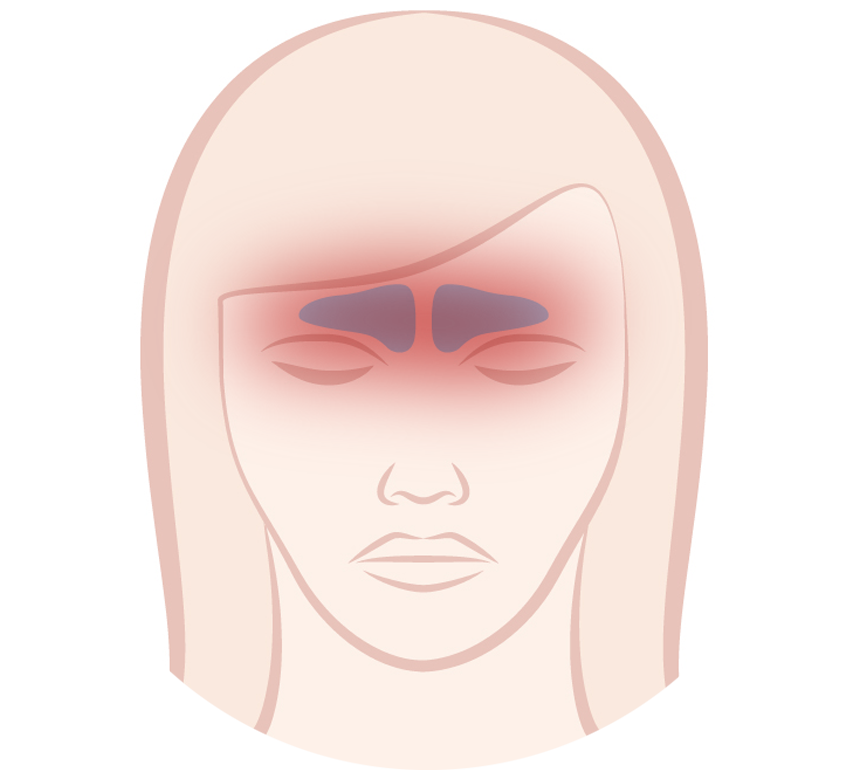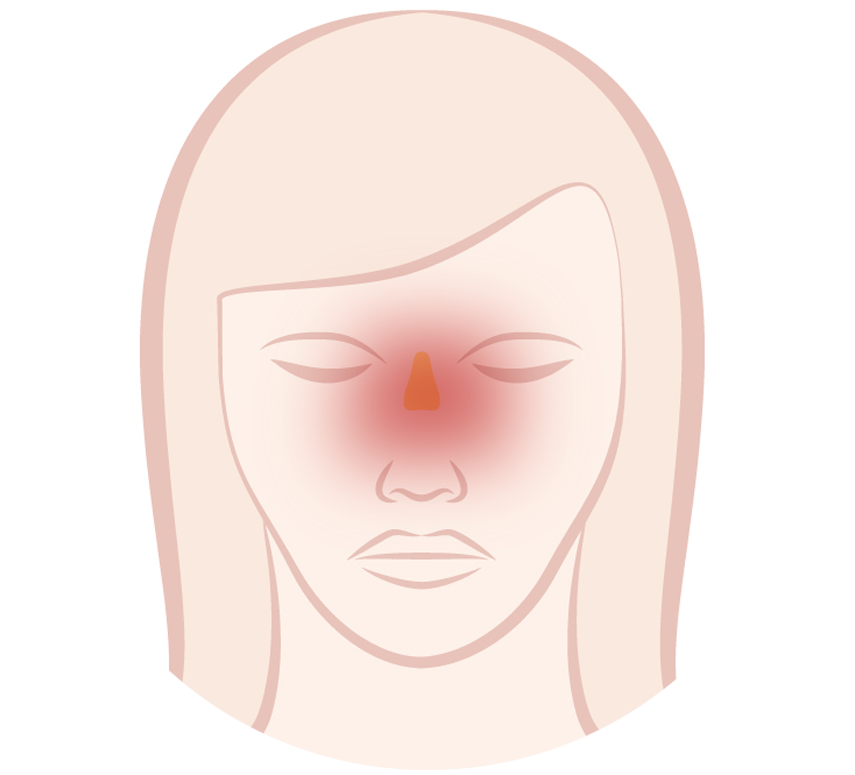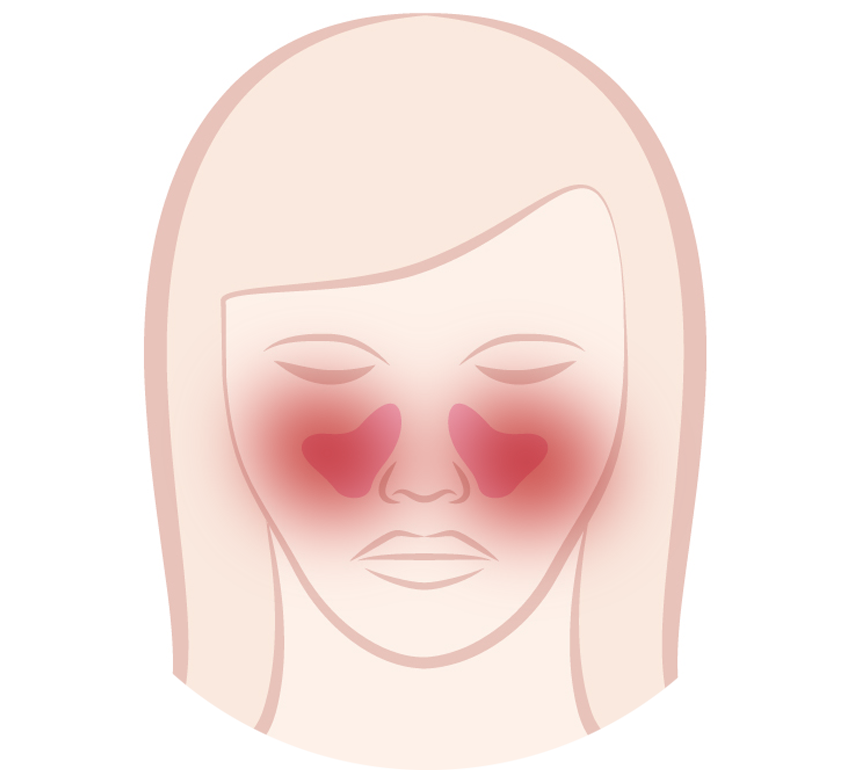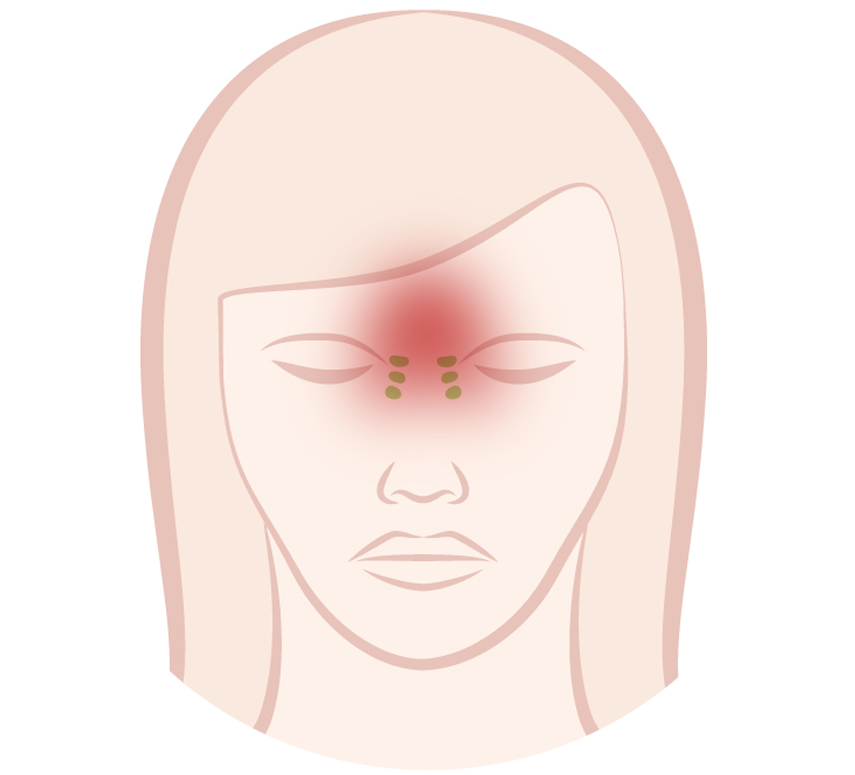Headache from sinusitis and facial pressure
Facial pressure and headache caused by an episode of sinusitis are due to the accumulation of mucus in the sinuses. Relief is achieved by draining the mucus, and to do this it is necessary to restore the function of the mucosa of the sinuses and nasal passages that the sinusitis has damaged.
Depending on where the mucus accumulates, facial pressure and/or headache may be felt predominantly in:

The forehead
The two frontal sinuses are located just above the eyebrows

The nose and its sides
The two sphenoid sinuses are located behind the ethmoid sinuses

Jaw and teeth
The two maxillary sinuses are located on the cheekbones

Between the eyes
The two ethmoid sinuses are located on each side of the bridge of the nose
What is the function of the sinuses?
The main function of the sinuses is to heat and humidify the air we breathe. They also serve to remove particles and microorganisms from the nasal cavities.
Due to the small size of the openings (ostium) that connect the sinuses and the nose, when the mucosa becomes inflamed, the drainage of mucus is impossible.
The normal functioning of the sinuses depends on three essential components:
- Clear mucus production (about 1 liter a day)
- Normal functioning of cilia (microscopic hairs that sweep mucus to the back of the nose)
- Opening of the ostium (small holes that connect the sinuses with the ducts that conduct mucus into the nasopharynx)
Main causes of sinus headache
Common Cold
Flu
Nasal polyps
Permanent Nasal Congestion
Allergies

How to deal with a headache from sinusitis?
When cold symptoms last for more than 10 days, it is called acute post-viral sinusitis. The most characteristic symptoms of this condition are: nasal congestion, runny nose, reduction or loss of smell and pressure and/or facial pain.
The headache and facial pressure caused by sinusitis are due to the accumulation of mucus; to relieve it, the correct functioning of the mucosa of the nasal and paranasal sinuses must be restored. This is achieved by restoring the movement of the cilia, opening the ostium and increasing the production of clear (physiological) mucus.
Antibiotics are only recommended in the case of bacterial sinus infection and account for only 0.5–2 % of diagnosed cases.
Frequently Asked Questions About Sinusitis Headache and Facial Pressure
Should I take anti-inflammatories during a sinus headache?
Some medications don’t fix sinusitis (they don’t cure it), but they relieve pain. The best known and most commonly used analgesics and anti-inflammatory drugs for headaches include ibuprofen and paracetamol.
How long can a sinus headache last?
Unlike headaches (cafelea) caused by other diseases, the one produced by sinusitis can last for weeks and even months, with varying intensity, as long as the accumulated mucus in the sinuses is not drained.
Should I use medication for nasal congestion to relieve sinus facial pressure?
Decongestants will relieve nasal obstruction and allow breathing through the nose for a few hours after use, but they will not drain the mucus accumulated in the sinuses, which is the cause of facial pressure or pain.
It is important to use decongestants as indicated in the instructions for use, i.e. a maximum of 5 days and no more than 3 times a day. The abuse of decongestants produces a disease called vasomotor rhinitis, the main symptom of which is, paradoxically, nasal congestion.
Are mucolytics recommended during sinus headache?
In clinical trials, mucolytics have not shown any benefit in the treatment of sinusitis.
Only when used for at least 12 weeks together with an antibiotic (in bacterial sinusitis, which is very rare), one type of mucolytic (N-acetylcysteine) produced an improvement in sinus symptoms.
How to differentiate migraine and sinus headache?
It is not easy to distinguish between the headache caused by sinusitis and migraine, as the latter can present with nasal symptoms. However, there are some symptoms that help in the diagnosis. For example, if the pain is accompanied by nausea and/or vomiting, migraine should be considered.
If the headache occurs after an upper respiratory infection, e.g. a cold, the diagnosis is oriented towards sinusitis.
Finally, the duration of pain also gives clues as to its cause. If it lasts from a few hours to a couple of days, migraine should be considered, as the pain or pressure caused by sinusitis lasts for weeks or even months, with greater or lesser intensity.
Can Nasodren® relieve sinus headache?
Thanks to its dual mechanism of action, Nasodren® restores the functioning of the sinuses and relieves sinus headache and other symptoms of sinusitis from the first application for 24 hours. The recommended dosage is one application a day for 7–10 days.
Nasodren is a 100% natural, effective, and safe spray for the relief of facial pressure and headache caused by sinusitis. Quick relief from the first application.


